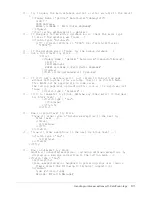
324
Chapter 15: Using Persistent Data and Locking
Creating a client variable
To create a client variable and set its value, use the
cfset
or
cfparam
tag and use the Client scope
identifier as a variable prefix; for example:
<cfset Client.FavoriteColor="Red">
After you set a client variable this way, it is available for use within any page in your application
that is accessed by the client for whom the variable is set.
The following example shows how to use the
cfparam
tag to check for the existence of a client
parameter and set a default value if the parameter does not already exist:
<cfparam name="Client.FavoriteColor" default="Red">
Accessing and changing client variables
You use the same syntax to access a client variable as for other types of variables. You can use client
variables anywhere you use other ColdFusion variables.
To display the favorite color that has been set for a specific user, for example, use the following
code:
<cfoutput>
Your favorite color is #Client.FavoriteColor#.
</cfoutput>
To change the client’s favorite color, for example, use code such as the following:
<cfset Client.FavoriteColor = Form.FavoriteColor>
Standard client variables
The Client scope has the following built-in, read-only variables that your application can use:
Note:
ColdFusion lets you delete or change the values of the built-in client variables. As a general
rule, avoid doing so.
Variable
Description
Client.CFID
The client ID, normally stored on the client system as a cookie.
Client.CFToken
The client security token, normally stored on the client system as a cookie.
Client.URLToken
Value depends on whether J2EE session management is enabled.
No session management or ColdFusion session management:
A
combination of the
CFID
and
CFToken
values, in the form
CFID
=IDNum
&CFTOKEN=
tokenNum
. This variable is useful if the client does not
support cookies and you must pass the
CFID
and
CFToken
variables from
page to page.
J2EE session management:
A combination of
CFID,
CFToken
, and
session ID values in the form
CFID=
IDNum
&CFTOKEN=
tokenNum
&jsessionid=
SessionID
.
Client.HitCount
The number of page requests made by the client.
Client.LastVisit
The last time the client visited the application.
Client.TimeCreated
The time the
CFID
and
CFToken
variables that identify the client to
ColdFusion were first created.
Содержание ColdFusion MX
Страница 1: ...Developing ColdFusion MX Applications...
Страница 22: ...22 Contents...
Страница 38: ......
Страница 52: ...52 Chapter 2 Elements of CFML...
Страница 162: ......
Страница 218: ...218 Chapter 10 Writing and Calling User Defined Functions...
Страница 250: ...250 Chapter 11 Building and Using ColdFusion Components...
Страница 264: ...264 Chapter 12 Building Custom CFXAPI Tags...
Страница 266: ......
Страница 314: ...314 Chapter 14 Handling Errors...
Страница 344: ...344 Chapter 15 Using Persistent Data and Locking...
Страница 349: ...About user security 349...
Страница 357: ...Security scenarios 357...
Страница 370: ...370 Chapter 16 Securing Applications...
Страница 388: ...388 Chapter 17 Developing Globalized Applications...
Страница 408: ...408 Chapter 18 Debugging and Troubleshooting Applications...
Страница 410: ......
Страница 426: ...426 Chapter 19 Introduction to Databases and SQL...
Страница 476: ...476 Chapter 22 Using Query of Queries...
Страница 534: ...534 Chapter 24 Building a Search Interface...
Страница 556: ...556 Chapter 25 Using Verity Search Expressions...
Страница 558: ......
Страница 582: ...582 Chapter 26 Retrieving and Formatting Data...
Страница 668: ......
Страница 734: ...734 Chapter 32 Using Web Services...
Страница 760: ...760 Chapter 33 Integrating J2EE and Java Elements in CFML Applications...
Страница 786: ...786 Chapter 34 Integrating COM and CORBA Objects in CFML Applications...
Страница 788: ......
Страница 806: ...806 Chapter 35 Sending and Receiving E Mail...
















































